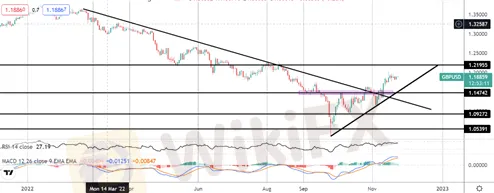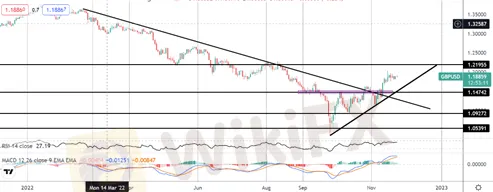OECD Flags Fresh UK Growth Fears
Sommario:The OECD flags the UK’s cost-of-living crisis and persistently weak business investment as key factors undermining the country’s growth terminal. The OECD also suggests that Brexit is a key reason as to why the UK will be outperformed by most of its peers next year, as it has severely damaged trade with the EU placing more pressure on the economy at a time of acute financial distress.

OECD Bearish on UK Growth

The OECD flags the UK‘s cost-of-living crisis and persistently weak business investment as key factors undermining the country’s growth terminal. The OECD also suggests that Brexit is a key reason as to why the UK will be outperformed by most of its peers next year, as it has severely damaged trade with the EU placing more pressure on the economy at a time of acute financial distress.
The latest report from the OECD yesterday has cast further dark clouds over the UK economy. The group warned that the UK, the fifth largest global economy as of last year, is facing a unique downturn which other economies in the G7 are not facing. Indeed, in a table of 22 world economies, the UK is among only three economies looking at negative growth next year, alongside Russia and Germany. While the global economy as a whole is forecast to grow 2.2% next year, largely propped up by rebounding growth in emerging markets economies, the UK economy is forecast to shrink by 0.4%.
UK Inflation Woes
One of the key drivers behind the harsher economic outlook for the UK is inflation. While we have started to see inflation moderating in the US and Eurozone for example, UK inflation was seen soaring to fresh multi-decade highs last month at 11.1%, a full 1% jump on the prior month‘s reading. With inflation looking likely to remain entrenched at higher levels well into next year, the impact on growth will be significant. The OECD now forecasts UK inflation to cool to only 6.6% next year and 3.3% in 2024, still above the BOE’s 2% target.
OECD Worried About UK Energy Payments Scheme
In particular, the OECD took issue with the UK governments energy price guarantee scheme which will see all domestic electricity users paid £400, to help reduce financial stress. However, the OECD argues that this will only drive inflation further higher, causing the need for more aggressive tightening from the BOE, which will have harsher consequences on growth yet again. Additionally, with the minimum wage set to rise next year in the UK, consumer spending power will be marginally boosted, potentially offsetting some of the weaker demand seen in the face of the cost-of-living crisis, again underpinning inflation and harming UK growth.
December BOE In Focus
Looking ahead, the main focus for UK investors now will be the last remaining BOE meeting of the year. With inflation still at record highs, a further hike from the BOE is widely expected though a smaller .5% hike is the consensus call for now. While the BOE has cited a desire to slow the pace of tightening, inflation is not yet allowing for this and if CPI continues to outperform into next year, we will likely start to see current BOE peak-rate projections revised higher, further damaging the UK growth outlook.
Technical Views
GBPUSD
The rally off the YTD lows in GBPUSD remains intact for now, underpinned by the rising trend line. Price has recently broken above the bear trend line from YTD highs and above the 1.1474 level. With momentum studies bullish, the outlook remains in favour of further rallies while 1.1474 holds, with 1.2195 the next resistance for bulls to note.


WikiFX Trader
FXTM
Exness
DBG Markets
EC Markets
EBC
Doo Prime
FXTM
Exness
DBG Markets
EC Markets
EBC
Doo Prime
WikiFX Trader
FXTM
Exness
DBG Markets
EC Markets
EBC
Doo Prime
FXTM
Exness
DBG Markets
EC Markets
EBC
Doo Prime
Rate Calc

